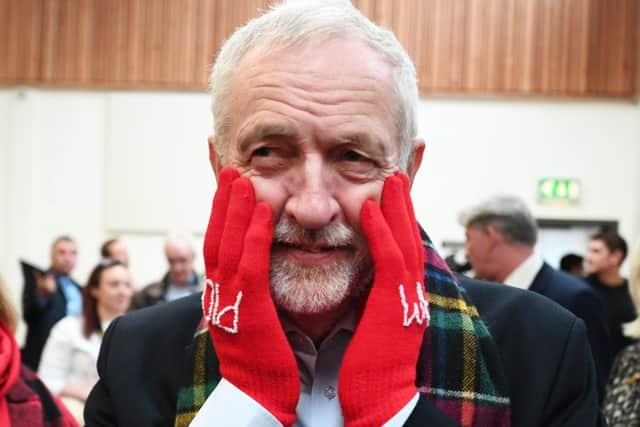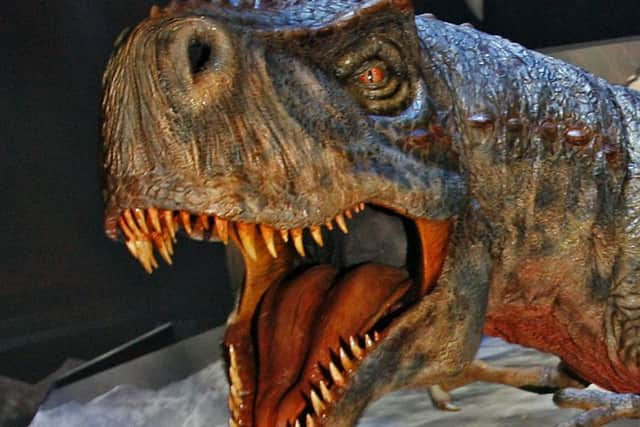Why some Labour voters plan to vote Tory in bid to save their party – Murdo Fraser
On my son’s bedroom wall is a poster depicting a number of dinosaurs. It is a daily reminder of these great beasts who ruled the Earth for millions of years, dominating all forms of life. And yet, today, they are all gone, and the only trace we find of them is when we dig up the odd fossil.
It is hard to find a better metaphor for the current state of the Scottish Labour Party. For most of my lifetime, Scottish Labour was the Tyrannosaurus rex of the political world, striking fear into political opponents.
Advertisement
Hide AdAdvertisement
Hide AdThe first-past-the-post voting system meant that Westminster elections throughout the 80s and 90s were dominated by Labour, who gave us giants like John Smith, Robin Cook and Gordon Brown.


How different is the picture today. In the 2015 general election, Labour lost all but one of their Scottish seats at Westminster. At the Holyrood election in the following year, they were relegated to third place at Holyrood behind the Conservatives.
The trend continues. In recent council by-elections across Scotland, the Labour vote was in freefall, collapsing to just five per cent in last month’s contest in Bridge of Don, Aberdeen. And, last week, in a by-election in Dunfermline Central, in what was once the South Fife fiefdom of Gordon Brown, the Labour vote share was cut in half to just 13.5 per cent, with the party trailing in a poor fourth behind SNP, Conservatives and Liberal Democrats.


Right across Scotland, the story is the same. The Labour vote is collapsing, with former supporters switching either to the Scottish Conservatives, or in places to Liberal Democrats, depending on how strongly they feel about either independence or Brexit.
Four policies in two days
Scottish Conservatives have made it quite clear that our primary message in the general election is our opposition to a second independence referendum. Unsurprisingly, this is attractive to the majority of Scottish voters who voted ‘No’ in 2014, and do not wish to have to go through that experience again.
And that group includes a large chunk of former Labour supporters, who are now upset and confused by their own party’s swithering stance on this most vital of issues. During Jeremy Corbyn’s visit to Scotland last week, he contrived to announce four quite distinct positions on the second independence referendum, in just 48 hours.
Firstly, he pledged that indyref2 would be ruled out for the whole five years of the next Westminster parliament. This was quickly contradicted, however, in a briefing from his aides, who said that position would change if the SNP won the majority in the 2021 Holyrood election.
Only hours later, the position had shifted again, saying that the referendum would not happen within “the early years of a Labour government”. The following day, this was refined to no referendum within the first two years of Labour being in power at Westminster, a position which was repeated by Corbyn in television interviews on Sunday.
Advertisement
Hide AdAdvertisement
Hide AdObservers might wonder why Labour simply do not take the easy option, and rule out a second independence referendum for the next parliament, as the Conservatives have done. But Labour have to keep the door open to a possible coalition deal, or at least confidence-and-supply, with the SNP, in the event that they are the largest party after the general election. Ruling out indyref2 indefinitely will make that deal much harder to do. So the narrow partisan interests of Labour are being put ahead of the future of the Union.
No fans of Johnson
In light of all this confusion, it is not surprising that there is despair within Labour ranks in Scotland. Corbyn, with his warmness towards terrorist groups in the past, and with his extreme left-of-centre views, was always regarded as an electoral liability even before his swithering on the referendum question.
Labour’s longest serving MP in Scotland, Ian Murray, does not mention Corbyn at all on his election literature, and indeed it is a struggle even to see the word “Labour” on his leaflets. It speaks volumes that the most successful Scottish Labour politician of this generation views his re-election prospects as enhanced by putting as much distance as possible between himself and his party leader.
We have also seen two former Labour MPs in the shape of Michael McCann and Tom Harris now stating they cannot vote for Labour in the forthcoming general election, and in the case of Tom Harris even going so far as to say he would vote Conservative, as the only party that should be trusted to defend the Union.
In contrast to this confusion, the Conservatives have been entirely clear. Boris Johnson has made it plain that if he is Prime Minister he will not grant consent to a second independence referendum. Pro-Union voters in Scotland can support the Conservatives on 12 December, in the confidence that a Conservative government will not be subjecting Scotland to a re-run of 2014, a referendum which, we should always be reminding ourselves, the SNP told us would be a “once-in-a-lifetime” event.
I have personally met a large number of former Labour voters who, whilst being no particular fans of Boris Johnson, will in this coming election hold their noses and vote Conservative, because right at this point in our history the future of the Union is the overriding political issue of the day. I have met other traditional Labour voters who simply cannot bring themselves to support Jeremy Corbyn as Prime Minister, and who will be making a tactical vote for the Conservatives in the hope that a crushing defeat for Labour nationally will bring the party to its senses, and see the election of a more moderate figure as Labour leader in the future.
Whatever their reasons, the opinion polls confirm the results of recent council by-elections, in that Scottish Labour are heading for a humiliating fourth place in the upcoming general election. It could well be Scottish Labour’s worst election result in a century. And they will only have themselves to blame, with a deeply unpopular leader, and a highly confused position on the constitution.
The dinosaurs might well have ruled the Earth for millions of years, but they are now all extinct. Scottish Labour may well be heading the same way.
Murdo Fraser is a Conservative MSP for Mid-Scotland and Fife
